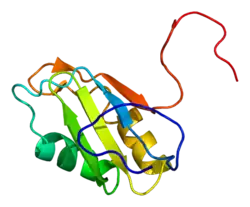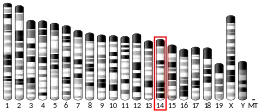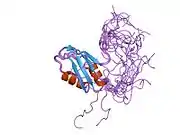HNRNPC
Heterogeneous nuclear ribonucleoproteins C1/C2 is a protein that in humans is encoded by the HNRNPC gene.[5][6]
| HNRNPC | |||||||||||||||||||||||||||||||
|---|---|---|---|---|---|---|---|---|---|---|---|---|---|---|---|---|---|---|---|---|---|---|---|---|---|---|---|---|---|---|---|
 | |||||||||||||||||||||||||||||||
| |||||||||||||||||||||||||||||||
| Identifiers | |||||||||||||||||||||||||||||||
| Aliases | HNRNPC, C1, C2, HNRNP, HNRPC, SNRPC, heterogeneous nuclear ribonucleoprotein C (C1/C2), heterogeneous nuclear ribonucleoprotein C | ||||||||||||||||||||||||||||||
| External IDs | OMIM: 164020 MGI: 107795 HomoloGene: 74524 GeneCards: HNRNPC | ||||||||||||||||||||||||||||||
| |||||||||||||||||||||||||||||||
| |||||||||||||||||||||||||||||||
| |||||||||||||||||||||||||||||||
| |||||||||||||||||||||||||||||||
| Wikidata | |||||||||||||||||||||||||||||||
| |||||||||||||||||||||||||||||||
It is abnormally expressed in fetuses of both IVF and ICSI, which may contribute to the increase risk of birth defects in these ART.[7]
Function
This gene belongs to the subfamily of ubiquitously expressed heterogeneous nuclear ribonucleoproteins (hnRNPs). The hnRNPs are RNA binding proteins and they complex with heterogeneous nuclear RNA (hnRNA). These proteins are associated with pre-mRNAs in the nucleus and appear to influence pre-mRNA processing(reference: Koenig J. nature structural and Molecular Biology 2010: iCLIP) and other aspects of mRNA metabolism and transport. While all of the hnRNPs are present in the nucleus, some seem to shuttle between the nucleus and the cytoplasm. The hnRNP proteins have distinct nucleic acid binding properties. Transcriptional regulation by hormonal 1,25-dihydroxyvitamin D(3) (calcitriol) involves occupancy of vitamin D response elements (VDREs) by HNRNPC or 1,25(OH)(2)D(3)-bound vitamin D receptor (VDR).[8][9][10] This relationship is disrupted by elevated HNRNPC, causing a form of hereditary vitamin D-resistant rickets (HVDRR) in both humans[8] and non-human primates.[11] The protein encoded by this gene can act as a tetramer and is involved in the assembly of 40S hnRNP particles. Species-specific tetramerization of HNRNPC subunits is important to its nucleic acid binding, whereby over-expression of major human HNRNPC subunits in mouse osteoblastic cells confers vitamin D resistance.[12] Multiple transcript variants encoding at least two different isoforms have been described for this gene.[6]
References
- GRCh38: Ensembl release 89: ENSG00000092199 - Ensembl, May 2017
- GRCm38: Ensembl release 89: ENSMUSG00000060373 - Ensembl, May 2017
- "Human PubMed Reference:". National Center for Biotechnology Information, U.S. National Library of Medicine.
- "Mouse PubMed Reference:". National Center for Biotechnology Information, U.S. National Library of Medicine.
- Nakagawa TY, Swanson MS, Wold BJ, Dreyfuss G (May 1986). "Molecular cloning of cDNA for the nuclear ribonucleoprotein particle C proteins: a conserved gene family". Proc Natl Acad Sci U S A. 83 (7): 2007–11. Bibcode:1986PNAS...83.2007N. doi:10.1073/pnas.83.7.2007. PMC 323219. PMID 3457372.
- "Entrez Gene: HNRPC heterogeneous nuclear ribonucleoprotein C (C1/C2)".
- Zhang Y, Zhang YL, Feng C, Wu YT, Liu AX, Sheng JZ, Cai J, Huang HF (September 2008). "Comparative proteomic analysis of human placenta derived from assisted reproductive technology". Proteomics. 8 (20): 4344–56. doi:10.1002/pmic.200800294. PMID 18792929. S2CID 206362532.
- Lisse TS, Liu T, Irmler M, Beckers J, Chen H, Adams JS, Hewison M (March 2011). "Gene targeting by the vitamin D response element binding protein reveals a role for vitamin D in osteoblast mTOR signaling". FASEB J. 25 (3): 937–47. doi:10.1096/fj.10-172577. PMC 3042839. PMID 21123297.
- Chen H, Hewison M, Adams JS (December 2006). "Functional characterization of heterogeneous nuclear ribonuclear protein C1/C2 in vitamin D resistance: a novel response element-binding protein". J Biol Chem. 281 (51): 39114–20. doi:10.1074/jbc.m608006200. PMID 17071612.
- Lisse TS, Hewison M, Adams JS (March 2011). "Hormone response element binding proteins: novel regulators of vitamin D and estrogen signaling". Steroids. 76 (4): 331–9. doi:10.1016/j.steroids.2011.01.002. PMC 3042887. PMID 21236284.
- Adams JS, Chen H, Chun RF, Nguyen L, Wu S, Ren SY, Barsony J, Gacad MA (February 2003). "Novel regulators of vitamin D action and metabolism: Lessons learned at the Los Angeles zoo". J Cell Biochem. 88 (2): 308–14. doi:10.1002/jcb.10333. PMID 12520531. S2CID 25970432.
- Lisse TS, Vadivel K, Bajaj SP, Chun RF, Hewison M, Adams JS (July 2014). "The heterodimeric structure of heterogeneous nuclear ribonucleoprotein C1/C2 dictates 1,25-dihydroxyvitamin D-directed transcriptional events in osteoblasts". Bone Research. 2: 14011. doi:10.1038/boneres.2014.11. PMC 4261231. PMID 25506471.
- Romero F, Ramos-Morales F, Domínguez A, Rios RM, Schweighoffer F, Tocqué B, Pintor-Toro JA, Fischer S, Tortolero M (March 1998). "Grb2 and its apoptotic isoform Grb3-3 associate with heterogeneous nuclear ribonucleoprotein C, and these interactions are modulated by poly(U) RNA". J. Biol. Chem. 273 (13): 7776–81. doi:10.1074/jbc.273.13.7776. PMID 9516488.
Further reading
- Görlach M, Wittekind M, Beckman RA, Mueller L, Dreyfuss G (1992). "Interaction of the RNA-binding domain of the hnRNP C proteins with RNA". EMBO J. 11 (9): 3289–95. doi:10.1002/j.1460-2075.1992.tb05407.x. PMC 556863. PMID 1380452.
- Wittekind M, Görlach M, Friedrichs M, Dreyfuss G, Mueller L (1992). "1H, 13C, and 15N NMR assignments and global folding pattern of the RNA-binding domain of the human hnRNP C proteins". Biochemistry. 31 (27): 6254–65. doi:10.1021/bi00142a013. PMID 1385725.
- Burd CG, Swanson MS, Görlach M, Dreyfuss G (1990). "Primary structures of the heterogeneous nuclear ribonucleoprotein A2, B1, and C2 proteins: a diversity of RNA binding proteins is generated by small peptide inserts". Proc. Natl. Acad. Sci. U.S.A. 86 (24): 9788–92. Bibcode:1989PNAS...86.9788B. doi:10.1073/pnas.86.24.9788. PMC 298587. PMID 2557628.
- Merrill BM, Barnett SF, LeStourgeon WM, Williams KR (1989). "Primary structure differences between proteins C1 and C2 of HeLa 40S nuclear ribonucleoprotein particles". Nucleic Acids Res. 17 (21): 8441–9. doi:10.1093/nar/17.21.8441. PMC 335017. PMID 2587210.
- Swanson MS, Nakagawa TY, LeVan K, Dreyfuss G (1987). "Primary structure of human nuclear ribonucleoprotein particle C proteins: conservation of sequence and domain structures in heterogeneous nuclear RNA, mRNA, and pre-rRNA-binding proteins". Mol. Cell. Biol. 7 (5): 1731–9. doi:10.1128/mcb.7.5.1731. PMC 365274. PMID 3110598.
- Sébillon P, Beldjord C, Kaplan JC, Brody E, Marie J (1995). "A T to G mutation in the polypyrimidine tract of the second intron of the human beta-globin gene reduces in vitro splicing efficiency: evidence for an increased hnRNP C interaction". Nucleic Acids Res. 23 (17): 3419–25. doi:10.1093/nar/23.17.3419. PMC 307219. PMID 7567451.
- Kato S, Sekine S, Oh SW, Kim NS, Umezawa Y, Abe N, Yokoyama-Kobayashi M, Aoki T (1995). "Construction of a human full-length cDNA bank". Gene. 150 (2): 243–50. doi:10.1016/0378-1119(94)90433-2. PMID 7821789.
- Maruyama K, Sugano S (1994). "Oligo-capping: a simple method to replace the cap structure of eukaryotic mRNAs with oligoribonucleotides". Gene. 138 (1–2): 171–4. doi:10.1016/0378-1119(94)90802-8. PMID 8125298.
- Huang M, Rech JE, Northington SJ, Flicker PF, Mayeda A, Krainer AR, LeStourgeon WM (1994). "The C-protein tetramer binds 230 to 240 nucleotides of pre-mRNA and nucleates the assembly of 40S heterogeneous nuclear ribonucleoprotein particles". Mol. Cell. Biol. 14 (1): 518–33. doi:10.1128/mcb.14.1.518. PMC 358402. PMID 8264621.
- Hamilton BJ, Nagy E, Malter JS, Arrick BA, Rigby WF (1993). "Association of heterogeneous nuclear ribonucleoprotein A1 and C proteins with reiterated AUUUA sequences". J. Biol. Chem. 268 (12): 8881–7. doi:10.1016/S0021-9258(18)52955-0. PMID 8473331.
- Suzuki Y, Yoshitomo-Nakagawa K, Maruyama K, Suyama A, Sugano S (1997). "Construction and characterization of a full length-enriched and a 5'-end-enriched cDNA library". Gene. 200 (1–2): 149–56. doi:10.1016/S0378-1119(97)00411-3. PMID 9373149.
- Romero F, Ramos-Morales F, Domínguez A, Rios RM, Schweighoffer F, Tocqué B, Pintor-Toro JA, Fischer S, Tortolero M (1998). "Grb2 and its apoptotic isoform Grb3-3 associate with heterogeneous nuclear ribonucleoprotein C, and these interactions are modulated by poly(U) RNA". J. Biol. Chem. 273 (13): 7776–81. doi:10.1074/jbc.273.13.7776. PMID 9516488.
- Neubauer G, King A, Rappsilber J, Calvio C, Watson M, Ajuh P, Sleeman J, Lamond A, Mann M (1998). "Mass spectrometry and EST-database searching allows characterization of the multi-protein spliceosome complex". Nat. Genet. 20 (1): 46–50. doi:10.1038/1700. PMID 9731529. S2CID 585778.
- Sella O, Gerlitz G, Le SY, Elroy-Stein O (1999). "Differentiation-Induced Internal Translation of c-sis mRNA: Analysis of the cis Elements and Their Differentiation-Linked Binding to the hnRNP C Protein". Mol. Cell. Biol. 19 (8): 5429–40. doi:10.1128/mcb.19.8.5429. PMC 84385. PMID 10409733.
- Wang W, Furneaux H, Cheng H, Caldwell MC, Hutter D, Liu Y, Holbrook N, Gorospe M (2000). "HuR Regulates p21 mRNA Stabilization by UV Light". Mol. Cell. Biol. 20 (3): 760–9. doi:10.1128/MCB.20.3.760-769.2000. PMC 85192. PMID 10629032.
- Spångberg K, Wiklund L, Schwartz S (2000). "HuR, a protein implicated in oncogene and growth factor mRNA decay, binds to the 3' ends of hepatitis C virus RNA of both polarities". Virology. 274 (2): 378–90. doi:10.1006/viro.2000.0461. PMID 10964780.
- Shahied L, Braswell EH, LeStourgeon WM, Krezel AM (2001). "An antiparallel four-helix bundle orients the high-affinity RNA binding sites in hnRNP C: a mechanism for RNA chaperonin activity". J. Mol. Biol. 305 (4): 817–28. doi:10.1006/jmbi.2000.4331. PMID 11162094.
- Andersen JS, Lyon CE, Fox AH, Leung AK, Lam YW, Steen H, Mann M, Lamond AI (2002). "Directed proteomic analysis of the human nucleolus". Curr. Biol. 12 (1): 1–11. doi:10.1016/S0960-9822(01)00650-9. PMID 11790298.
- Stone JR, Collins T (2002). "Rapid phosphorylation of heterogeneous nuclear ribonucleoprotein C1/C2 in response to physiologic levels of hydrogen peroxide in human endothelial cells". J. Biol. Chem. 277 (18): 15621–8. doi:10.1074/jbc.M112153200. PMID 11877401.




